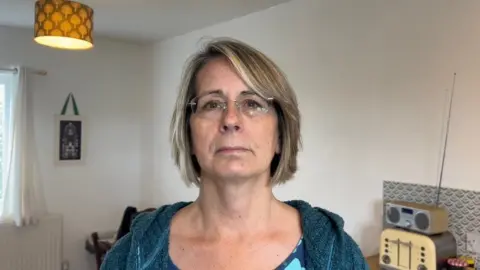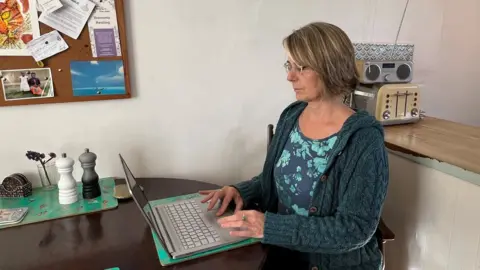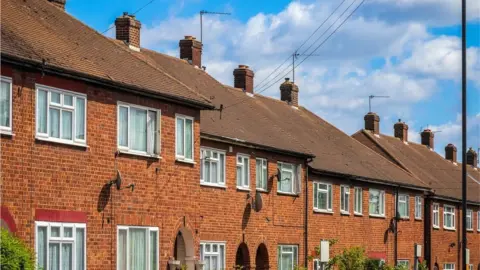No-fault evictions: Families 'in fear' of being forced out of their homes
 BBC
BBCThousands of tenants are facing being turned out of their homes after government plans to ban no-fault evictions were delayed last month. Families say they are living in a state of "fear and uncertainty" as they struggle to find somewhere to live in the lead up to Christmas.
"Sorry, we don't take pets. Sorry, we don't take kids and sorry, you do not earn enough."
These are words single mum Esther Lohneis said she has heard "time and time again".
The 55-year-old, who has two children, aged 11 and 19, and a cat, was told in April that her landlord had planned to move back into her three-bedroom house near Wells, in Somerset.
"When I found out, my heart just sank. Ever since, I have been on hyper-alert," she added.
"It is stressful as you live with it all the time - a constant state of fear and uncertainty."

After being handed a "no-fault" Section 21 eviction notice, Esther did not sleep properly, worried about how to care and provide for her family.
She said she struggled to find a new home and felt "excluded, squashed and pushed around".
"I am also having to deal with my children's needs and continue my work as a counsellor, in which I support other people's mental health, which is difficult at the moment," she said.

What is a no-fault eviction?
A no-fault eviction is a key piece of housing legislation, known as Section 21, which allows landlords to evict tenants without giving a reason.
After receiving a Section 21 notice, tenants have just two months before their landlord can apply for a court order to evict them.

Esther is not alone.
New Ministry of Justice data shows 8,399 landlords in England started no-fault eviction court proceedings against their tenants between July and September - the highest number for seven years.

Adam Heard, who lives near Bristol, was served with a Section 21 notice after his landlord decided to sell the property.
"We panicked, we do not know what to do," said Adam.
"My wife suffers with anxiety and she worries a lot, especially with the unknown. We could soon be kicked out of our home."
Adam and his wife have until 11 December to find somewhere new to live.
"It has put a lot of pressure on me. I am trying to run a cleaning business which has rising costs, and look after my wife," Adam said.
"There is not much on the market and most of it is out of our price range. We just need a bit more time."
When Esther was searching for a new home, she said there was an average of just 10 properties available for rent in a 15-mile (24 km) radius of the Mendips, where the family have lived for more than 20 years.
She has now found a new home and hopes to move in on 1 December.
 Getty Images
Getty ImagesEsther said: "I am a working mother who is trying to shield my children from all of this stress, but it is too much.
"We need more safe, secure and affordable housing."
Ministers have been promising to end the right of landlords in England to evict tenants without needing a reason since 2019.
Under the new Renters Reform Bill, landlords will only be able to evict tenants in certain circumstances.
These include when they wish to sell the property or when they or a close family member want to move in.
However, the government recently announced its plans to ban Section 21 will be indefinitely delayed until after the court system is reformed.
Ben Beadle, chief executive of the National Residential Landlords Association, said: "The current market conditions are forcing landlords to make difficult decisions.
"High mortgage interest rates means landlords are looking at their assets and realising they no longer provide a sustainable profit.
"You also have an ageing population of landlords, so all of these elements are really working together so landlords are needing to sell their properties to cash in."

Shelter, a campaign group which seeks to end homelessness, has called on the government to deliver on its promise of renters reforms and for the notice period for evictions to increase from two months to four months.
Tarun Bhakta, policy manager from Shelter, said: "Tenants are living in fear of making requests about conditions or challenging unfair rent increases because they know the landlord can just evict them with two months' notice.
"Action is needed to address the growing problem of insecurity in the private rental market."
Housing Secretary Michael Gove has told MPs that the ban cannot be enacted before a series of improvements are made in the court system, which is used by some landlords to reclaim possession of their homes.
Downing Street has not put a timescale on how long the promised reforms will take to achieve.

Follow BBC West on Facebook, X and Instagram. Send your story ideas to: [email protected]
